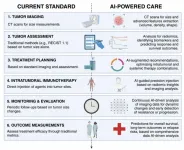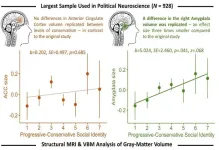(Press-News.org) Estimating past global temperature is important for understanding the history of life on Earth and for predicting future climate. Now, a new reconstruction of Earth’s temperature history over the past 485 million years – based on a method that combines diverse physical proxy data with climate model predictions – reveals a much wider range of climate variability across the Phanerozoic eon than previously understood. The findings highlight atmospheric carbon dioxide (CO2) as the dominant factor controlling climate variability throughout this period, offering new insights into the Earth's climate sensitivity across long timescales. A record of global mean surface temperature (GMST) throughout the Phanerozoic – the last 540 million years during which animals and plants evolved – is crucial. Over the last 500 million years, climate shifts across the Phanerozoic have been closely tied to biological evolution, tectonic activity, and atmospheric and ocean chemistry. Studying this temperature evolution helps clarify the mechanisms driving long-term climate changes. Additionally, GMST data from the Phanerozoic provides important context for current human-induced warming. However, temperature reconstructions from this period have traditionally relied on disparate, incomplete proxy data or predictions from Earth systems models, which are difficult to confirm. According to Emily Judd and colleagues, both methods have suggested that global Phanerozoic temperatures have been generally colder and less variable than other studies of recent geological periods have shown. Such discrepancies raise doubts about the current view of Earth’s long-term climatic history.
Judd and colleagues present PhanDA – a state-of-the-art reconstruction of GMST spanning the last 485 million years. PhanDA is based on paleoclimate data assimilation (DA), a technique that statistically blends geological proxy data on past conditions with Earth system model simulations to create a more complete record of surface air temperatures across the Phanerozoic. According to Judd et al., the PhanDA reconstruction reveals that Earth's temperature has varied more dynamically than previously thought, exhibiting a large range of GMST, spanning 11 degrees Celsius (°C) to 36° C. The authors also identified five distinct climate states and show that more of Earth’s history was spent in warmer rather than colder climates. Moreover, the findings demonstrate a strong link between global temperatures and atmospheric carbon dioxide levels, suggesting that CO2 has been the primary driver of climate changes over this period. However, Judd et al. note that the nature of this link is likely complex and will require further research to constrain. In a Perspective, Benjamin Mills discusses the study and its limitations in greater detail.
Raw data files for this paper are available to news outlets interested in building their own data visualizations. Please contact Emily J. Judd at ejjudd@syr.edu for more information.
END
485 million-year temperature record of Earth reveals Phanerozoic climate variability
Summary author: Walter Beckwith
2024-09-19
ELSE PRESS RELEASES FROM THIS DATE:
Atmospheric blocking slows ocean-driven glacier melt in Greenland
2024-09-19
Cooling in the subsurface waters beneath Greenland’s Nioghalvfjerdsfjorden Glacier (79NG) from 2018 to 2021 was driven by European atmospheric blocking, which forced changes in the large-scale ocean circulation of the Nordic seas, researchers report, slowing glacial melt, despite ongoing global warming trends. The findings highlight the importance of regional atmospheric dynamics in influencing glacier stability. Understanding these dynamics is key to predicting the future of glaciers like ...
Study: Over nearly half a billion years, Earth’s global temperature has changed drastically, driven by carbon dioxide
2024-09-19
Published in the journal Science, the study presents a curve of global mean surface temperature that reveals Earth's temperature has varied more than previously thought over much of the Phanerozoic Eon a period of geologic time when life diversified, populated land and endured multiple mass extinctions. The curve also confirms Earth's temperature is strongly correlated to the amount of carbon dioxide in the atmosphere.
The start of the Phanerozoic Eon 540 million years ago is marked by the Cambrian ...
Clinical trial could move the needle in traumatic brain injury
2024-09-19
FOR IMMEDIATE RELEASE
Subscribe to UCSF News
Department of Defense-funded study aims to end a decades-long impasse in treatment development.
Traumatic brain injury (TBI) results in close to 70,000 deaths in the United States every year, and it is the cause of long-term physical, cognitive and mental disability in 5 million Americans. But despite three decades of work, treatments are sorely lacking.
Now, an innovative drug development trial will be available in emergency departments of 18 level 1 trauma sites nationwide. It is launched by UC San Francisco and the Transforming Research and Clinical Knowledge in Traumatic ...
AI model can reveal the structures of crystalline materials
2024-09-19
For more than 100 years, scientists have been using X-ray crystallography to determine the structure of crystalline materials such as metals, rocks, and ceramics.
This technique works best when the crystal is intact, but in many cases, scientists have only a powdered version of the material, which contains random fragments of the crystal. This makes it more challenging to piece together the overall structure.
MIT chemists have now come up with a new generative AI model that can make it much easier to determine the structures of these powdered crystals. The prediction model could help researchers characterize ...
MD Anderson Research Highlights for September 19, 2024
2024-09-19
HOUSTON ― The University of Texas MD Anderson Cancer Center’s Research Highlights showcases the latest breakthroughs in cancer care, research and prevention. These advances are made possible through seamless collaboration between MD Anderson’s world-leading clinicians and scientists, bringing discoveries from the lab to the clinic and back.
Genetic factors underscore disparities in colorectal cancer survival
Patients with colorectal cancer have varied overall survival, but it remains unclear how the frequency of certain gene mutations among different racial and ethnic groups influences outcomes. To investigate, researchers led by John Paul Shen, M.D., and ...
The role of artificial intelligence in advancing intratumoral immunotherapy
2024-09-19
“We explore how integrating these technologies could revolutionize personalized oncology.”
BUFFALO, NY- September 19, 2024 – A new editorial was published in Oncotarget's Volume 15 on September 17, 2024, entitled, “The emerging role of AI in enhancing intratumoral immunotherapy care.”
As highlighted in the abstract of this editorial, the emergence of immunotherapy (IO), and more recently, intratumoral IO, offers a novel approach to cancer treatment. This method enhances immune responses, allows for combination therapies, and helps reduce systemic adverse events. These techniques aim to ...
Political ideology is associated with differences in brain structure, but less than previously thought
2024-09-19
Conservative voters have slightly larger amygdalas than progressive voters—by about the size of a sesame seed. In a replication study publishing September 19 in the Cell Press journal iScience, researchers revisited the idea that progressive and conservative voters have identifiable differences in brain morphology, but with a 10x larger and more diverse sample size than the original study. Their results confirmed that the size of a person’s amygdala is associated with their political views but failed to find a consistent association between politics and the anterior cingulate cortex (ACC). Anatomical differences in both ...
Genetic tracing at the Huanan Seafood market further supports COVID animal origins
2024-09-19
A new international collaborative study provides a list of the wildlife species present at the market from which SARS-CoV-2, the virus responsible for the COVID-19 pandemic, most likely arose in late 2019. The study is based on a new analysis of metatranscriptomic data released by the Chinese Center for Disease Control and Prevention (CDC). The data come from more than 800 samples collected in and around the Huanan Seafood Wholesale market beginning on January 1, 2020, and from viral genomes reported from early COVID-19 patients. The research appears September 19 in the journal Cell.
“This is one of the most ...
Breastfeeding is crucial to shaping infant’s microbes and promoting lung health
2024-09-19
Human breast milk regulates a baby’s mix of microbes, or microbiome, during the infant’s first year of life. This in turn lowers the child’s risk of developing asthma, a new study shows.
Led by researchers at NYU Langone Health and the University of Manitoba, the study results showed that breastfeeding beyond three months supports the gradual maturation of the microbiome in the infant’s digestive system and nasal cavity, the upper part of the respiratory tract. Conversely, stopping breastfeeding earlier than three months disrupts the paced development of the microbiome and ...
Scientists at the CNIC discover an unexpected involvement of sodium transport in mitochondrial energy generation
2024-09-19
The GENOXPHOS (Functional Genetics of the Oxidative Phosphorylation System) group at the Centro Nacional de Investigaciones Cardiovasculares (CNIC) has discovered a crucial role of sodium in the generation of cellular energy. The study, led by GENOPHOS group leader Dr. José Antonio Enríquez, also involved the participation of scientists from the Complutense University of Madrid, the Biomedical Research Institute at Hospital Doce de Octubre, the David Geffen School of Medicine at UCLA, and the Spanish research networks on frailty and healthy aging (CIBERFES) ...
LAST 30 PRESS RELEASES:
Fund for Science and Technology awards $15 million to Scripps Oceanography
New NIH grant advances Lupus protein research
New farm-scale biochar system could cut agricultural emissions by 75 percent while removing carbon from the atmosphere
From herbal waste to high performance clean water material: Turning traditional medicine residues into powerful biochar
New sulfur-iron biochar shows powerful ability to lock up arsenic and cadmium in contaminated soils
AI-driven chart review accurately identifies potential rare disease trial participants in new study
Paleontologist Stephen Chester and colleagues reveal new clues about early primate evolution
UF research finds a gentler way to treat aggressive gum disease
Strong alcohol policy could reduce cancer in Canada
Air pollution from wildfires linked to higher rate of stroke
Tiny flows, big insights: microfluidics system boosts super-resolution microscopy
Pennington Biomedical researcher publishes editorial in leading American Heart Association journal
New tool reveals the secrets of HIV-infected cells
HMH scientists calculate breathing-brain wave rhythms in deepest sleep
Electron microscopy shows ‘mouse bite’ defects in semiconductors
Ochsner Children's CEO joins Make-A-Wish Board
Research spotlight: Exploring the neural basis of visual imagination
Wildlife imaging shows that AI models aren’t as smart as we think
Prolonged drought linked to instability in key nitrogen-cycling microbes in Connecticut salt marsh
Self-cleaning fuel cells? Researchers reveal steam-powered fix for ‘sulfur poisoning’
Bacteria found in mouth and gut may help protect against severe peanut allergic reactions
Ultra-processed foods in preschool years associated with behavioural difficulties in childhood
A fanged frog long thought to be one species is revealing itself to be several
Weill Cornell Medicine selected for Prostate Cancer Foundation Challenge Award
Largest high-precision 3D facial database built in China, enabling more lifelike digital humans
SwRI upgrades facilities to expand subsurface safety valve testing to new application
Iron deficiency blocks the growth of young pancreatic cells
Selective forest thinning in the eastern Cascades supports both snowpack and wildfire resilience
A sea of light: HETDEX astronomers reveal hidden structures in the young universe
Some young gamers may be at higher risk of mental health problems, but family and school support can help
[Press-News.org] 485 million-year temperature record of Earth reveals Phanerozoic climate variabilitySummary author: Walter Beckwith




